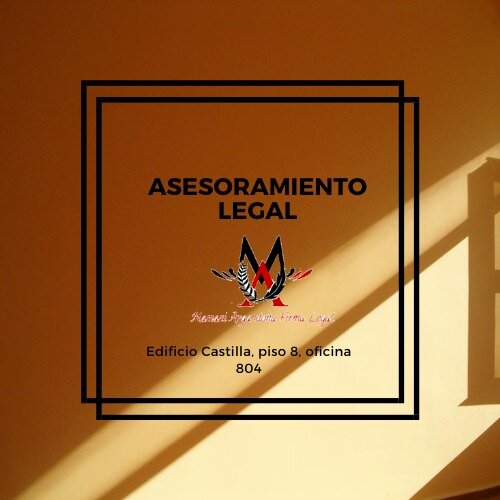Best Structured Finance Lawyers in Bolivia
Share your needs with us, get contacted by law firms.
Free. Takes 2 min.
Or refine your search by selecting a city:
List of the best lawyers in Bolivia
About Structured Finance Law in Bolivia
Structured finance in Bolivia involves complex, often large-scale financial transactions that go beyond traditional lending. It typically includes instruments like securitizations, asset-backed securities, syndicated loans, and other mechanisms designed to redistribute risk and provide access to capital for businesses and infrastructure projects. Bolivian laws and regulations around these instruments are influenced by both international practices and specific local financial regulations, making guidance from specialized legal professionals essential.
Why You May Need a Lawyer
Structured finance transactions are intricate, involving multiple parties, regulatory requirements, and sophisticated financial products. You may need a lawyer for several reasons:
- To draft and review complex financial agreements
- To ensure full compliance with Bolivian financial regulations and international standards
- To structure deals that minimize risk and maximize benefits
- For support in negotiating terms with banks, investors, or governmental entities
- To resolve legal disputes or manage defaults on structured finance products
- For guidance on tax implications of structured financial instruments
- To represent your interests before financial authorities if required
Local Laws Overview
Structured finance operations in Bolivia are regulated primarily by:
- The Financial System Law (Ley de Servicios Financieros), which sets out the fundamental rules for all financial activities
- Regulations issued by the Financial System Supervisory Authority (ASFI), which oversees compliance and authorizations for financial contracts
- Banking regulations that affect syndicated loans and other non-traditional financing forms
- Taxation laws related to transfer pricing, capital gains, and VAT, which can impact the cost and structure of finance deals
- Contract law and securities law, setting the requirements for enforceability of financial instruments and assignments
Understanding how these statutes work together is vital for structuring deals that are both legal and commercially effective in Bolivia.
Frequently Asked Questions
What is structured finance?
Structured finance refers to financial transactions that use complex legal and financial arrangements to pool assets, transfer risk, or secure funding through specially-designed instruments such as securitizations, asset-backed securities, and syndicated loans.
Are structured finance products legal in Bolivia?
Yes, structured finance products are permitted in Bolivia, but they must comply with national financial regulations, including those established by the financial supervisor, ASFI.
What is ASFI's role in structured finance transactions?
ASFI (Autoridad de Supervisión del Sistema Financiero) is the main regulatory authority for financial institutions, including the approval and oversight of structured finance products to ensure stability and legal compliance.
Can foreign investors participate in Bolivian structured finance deals?
Foreign investors can participate but must adhere to local rules regarding capital flows, registration, and limits on certain kinds of investments as set forth by local regulations and ASFI.
What are the tax implications of structured finance in Bolivia?
Taxation can significantly affect structured finance operations. Issues to consider include VAT, capital gains, and withholding taxes, as determined by the Servicio de Impuestos Nacionales (Bolivian Tax Authority).
How does securitization work under Bolivian law?
Securitization in Bolivia involves pooling financial assets and issuing securities backed by those assets. The structure must comply with local securities and banking law requirements to be legal and effective.
What risks exist with structured finance transactions?
Risks can include credit default, legal enforceability, regulatory uncertainty, and market risk. Proper legal structuring and due diligence are essential to mitigate these risks.
Do I need regulatory approval to issue structured finance products?
Yes, most structured finance products require prior approval from ASFI and sometimes other authorities, depending on the nature of the transaction and the parties involved.
Can structured finance be used for public infrastructure projects?
Yes, structured finance solutions, such as project finance and securitization, are frequently used in large public infrastructure projects to distribute risk and attract private investment.
How do I find a qualified structured finance lawyer in Bolivia?
Look for attorneys or law firms with experience in banking law, capital markets, and financial regulation. Many reputable firms in Bolivia highlight their expertise in these areas and are familiar with both local and cross-border structured finance transactions.
Additional Resources
Several organizations and resources can assist those seeking legal information or practical advice on structured finance in Bolivia:
- ASFI (Autoridad de Supervisión del Sistema Financiero) - The main financial regulator providing guidance and authorizations
- Ministerio de Economía y Finanzas Públicas - Responsible for fiscal policy and relevant economic regulations
- Bolivian Stock Exchange (Bolsa Boliviana de Valores) - Offers resources on securities and public debt instruments
- Servicio de Impuestos Nacionales - Bolivia’s tax authority, provides information on income tax, VAT, and other tax topics
- Bolivian Bar Association - Directory of licensed attorneys, including those specializing in finance law
Next Steps
If you need legal assistance with structured finance in Bolivia, consider the following approach:
- Define your specific objectives and gather relevant documents about your intended transaction
- Identify and consult with lawyers or law firms specializing in structured finance and financial law
- Prepare a list of questions or concerns to discuss during your consultation
- Check the lawyer’s credentials and experience with similar transactions in Bolivia
- Collaborate closely with your legal advisor to ensure compliance, proper structuring, and successful execution of your deal
- Stay informed about regulatory changes by following updates from ASFI and other relevant authorities
By following these steps, you will be better equipped to navigate the complexities of structured finance in Bolivia and protect your financial interests.
Lawzana helps you find the best lawyers and law firms in Bolivia through a curated and pre-screened list of qualified legal professionals. Our platform offers rankings and detailed profiles of attorneys and law firms, allowing you to compare based on practice areas, including Structured Finance, experience, and client feedback.
Each profile includes a description of the firm's areas of practice, client reviews, team members and partners, year of establishment, spoken languages, office locations, contact information, social media presence, and any published articles or resources. Most firms on our platform speak English and are experienced in both local and international legal matters.
Get a quote from top-rated law firms in Bolivia — quickly, securely, and without unnecessary hassle.
Disclaimer:
The information provided on this page is for general informational purposes only and does not constitute legal advice. While we strive to ensure the accuracy and relevance of the content, legal information may change over time, and interpretations of the law can vary. You should always consult with a qualified legal professional for advice specific to your situation.
We disclaim all liability for actions taken or not taken based on the content of this page. If you believe any information is incorrect or outdated, please contact us, and we will review and update it where appropriate.
Browse structured finance law firms by city in Bolivia
Refine your search by selecting a city.

















